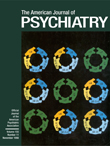To the Editor: In their study, Russell and colleagues present follow-up IQ measures for 34 adults with schizophrenia who had had initial IQ measurement 20 years earlier when they were referred to a child psychiatry clinic for a variety of psychiatric disorders. Comparing the averaged IQ scores for the adult patients with schizophrenia with their own averaged IQ as children, Russell et al. report that the individuals included in their study initially showed an impairment in general intellectual function and that there was no significant difference between the patients’ averaged childhood and adult IQs. The authors conclude that their findings are consistent with the neurodevelopemental concept of schizophrenia and that a lesion occurring during early brain development may be responsible for both the childhood and adult cognitive impairment of patients with schizophrenia.
One may quarrel with many aspects of this report of Russell et al., e.g., the nonrandomness of the group on which their statistics are based (one-third of the original group was excluded because they did not have the second [adult] IQ examination) and, indeed, the question of whether the sample of the schizophrenic population from which the cohort was drawn was representative. Most adult patients with schizophrenia do not have 1) a history of referral to a psychiatry clinic as children or 2) childhood IQs one to two standard deviations below the norm, as did one-third of this group. Moreover, the IQs of those included were 14 points below the scores of those not tested a second time and, hence, excluded from the sample). However, except for their choice of title and the final paragraph of their discussion, Russell and colleagues are appropriately modest in making claims for generalization of their findings. The authors are also to be commended for reporting not just their summary statistics but graphic representation of the data thus summarized (a numerical table would be even better, as it is possible to determine IQs of only 19 of the 34 individuals represented on the graph). It would be useful if all journal editors required authors to report similarly, to the extent possible, the actual data that their statistics summarize.
Even if they reject the evidence that cognitive impairment follows onset of the illness in many (but by no means all) patients with schizophrenia as reported by most investigators from Kraepelin
(1) onward
(2, 3), the data presented by Russell et al. fail to support their conclusion that “the deficit in intellectual function observed in these patients, and reported in the literature, is lifelong and predates the onset of schizophrenia.” In contrast to the majority of adults with schizophrenia, for whom the premorbid intelligence and mental statuses are within normal limits
(2), the mean childhood IQ score for the cohort of Russell et al. was 82.4; as children, at least 10 patients had IQs below 80, and 38% were diagnosed with psychotic disorders. Of 10 patients with IQs below 80 at the childhood examination, the IQs of only two declined, and the IQs of seven increased at follow-up. In contrast, five of six patients with initial IQs of 100 or above had a
decrease in IQ of 10–20 points between the first examination and the second 20 years later. Averaging the scores from the first examination for all the patients and comparing these scores with averaged scores from the second examination 20 years later yielded an almost unchanged mean score for the entire cohort at follow-up. The authors suggest this is an example of “regression to the mean.” However, a decline of IQ by 15–20 points between late childhood and adult life is not a usual occurrence and requires a nonstatistical explanation. Moreover, their regression analysis found that the time 1 IQs explained only 60% of the variance in time 2 IQs, even after they corrected for age, sex, and so forth; this finding leads to the inference that something else, perhaps schizophrenia, played a role here.
The article of Russell et al. provides an excellent example of why the usual statistical measures of central tendency are not sufficient in this domain
(4). Pooling and averaging data of heterogeneous groups obscures the scientifically interesting findings in this report. The fact that IQs increased for some patients, stayed about the same for others, and declined for another subgroup indicates the need for inquiry into why these differences occur. There is also the question of the relationship of IQ changes to treatment. As Wyatt
(5) and others have reported, neuroleptic treatment of schizophrenia may decrease the decline in cognitive faculties formerly associated with this illness. It would be of great interest to explore the role that both original psychiatric diagnoses and time and type of treatment may have played in these very different trajectories of the schizophrenia syndrome.

